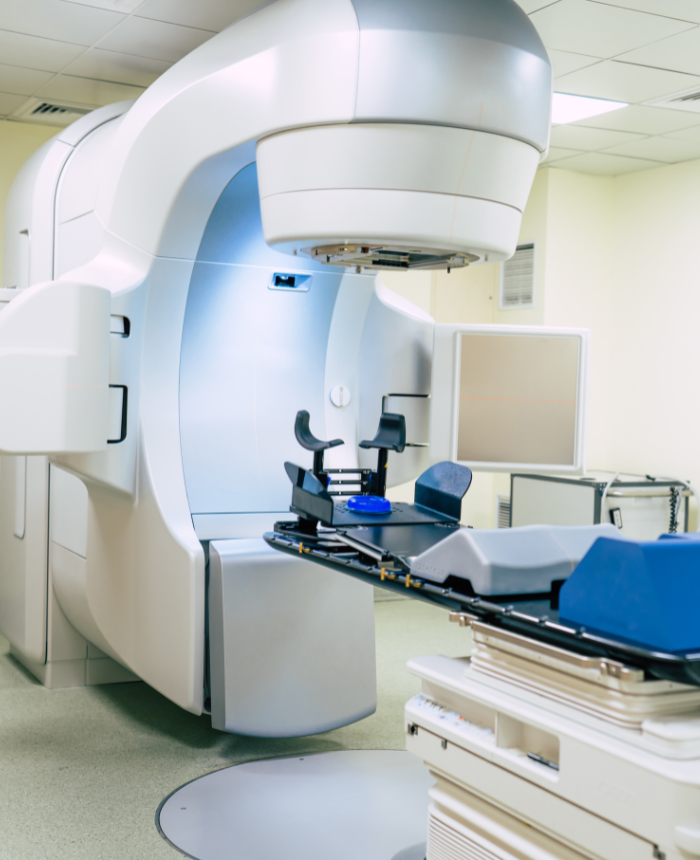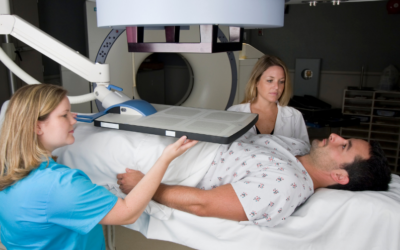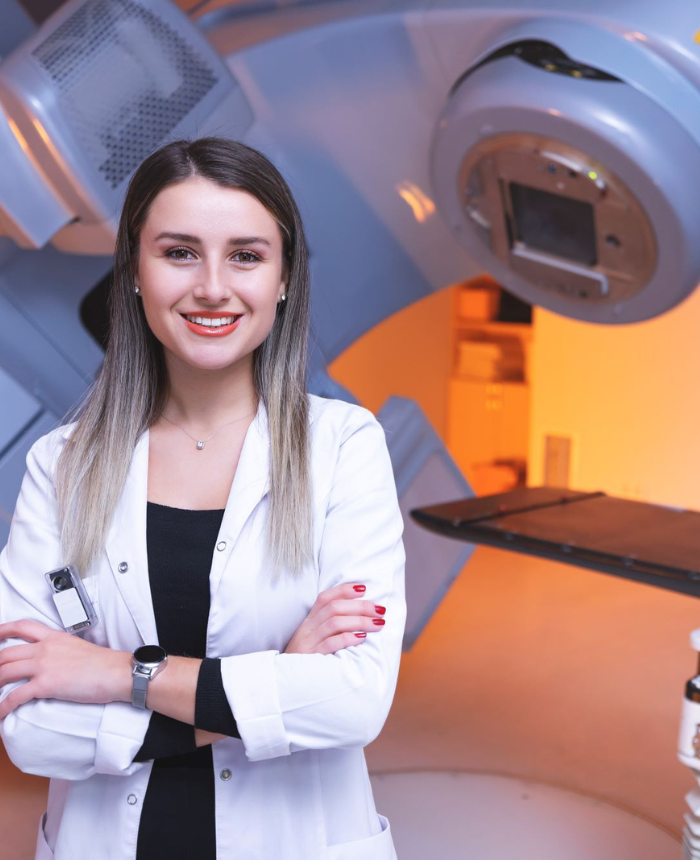
Treatment Technology
CBCT
Cone Beam CT
Integrated Cancer Care utilizes several different kinds of imaging and scanning technologies, and Cone Beam CT scans are among the technologies we use as part of your radiation treatment.
Cone Beam CT (CBCT) is used to treat prostate cancer and is typically used alongside Image-Guided Radiation Therapy treatment. CBCT scans produce 3-D images of soft tissues and are often used in addition to conventional CT scans throughout treatment.
By layering CBCT scans over CT images, we are able to provide a very high level of accuracy in your radiation treatments. Consistent imaging with tools like CBCT allow your radiation oncologists to make daily adjustments to your treatment in real time based on the cancer’s response to the treatment, the position of your organs, and the effect of treatment on your body. Not only does this allow for sophisticated radiation treatments directly to the areas that need it, but it also helps to protect any nearby healthy cells.
CBCT Patient Resources
Here are some resources to help you better understand your treatment; how to prepare for treatment; and what to expect before, during, and after treatment occurs.
How Long Does a Radiation Treatment Take?
How long does a single radiation treatment will take? It depends. Here, we’ll provide some answers that we hope will help prepare you for your radiation therapy journey.
How Radiation Oncology Centers Treat Prostate Cancer
Prostate cancer can be treated by radiation oncology centers using external beam radiation therapy (EBRT) or internal radiation (brachytherapy). Learn more here.
How IMRT for Prostate Cancer Helps Prevent Cancer Spread
Using IMRT for prostate cancer treatment kills cancer cells and helps stop the spread of cancer—improving a patient’s overall prognosis.
FAQs
Are CBCT Scans safe?
CBCT scans do use radiation, but they use less of it than traditional x-rays or CT scanners, and are more precise and effective than traditional x-rays- meaning less scans are required to get the same images. CBCT scans are also quick and non-invasive, and you remain awake throughout the short process.
How is a CBCT Scan done?
Generally a CBCT scan takes under a minute and doesn’t require any additional special preparation. The machine will then move around the targeted treatment area, taking panoramic x-rays using cone-shaped beams. When the scan is finished, you will be asked to step out of the machine. Once the images have finished rendering, your treatment will progress as normal.
Where can I get a CBCT scan done? Do I have to go somewhere else?
Integrated Cancer Care of Indiana performs CBCT scans in both our Greenwood and Indianapolis locations. Because CBCT scans for prostate cancer are provided immediately prior to and as a part of your daily treatments, you will have your scan completed at whichever of our locations you are receiving your radiation treatment at.
What do I need to be careful of with a CBCT scan?
We’ll ask you to remove anything that may interfere with the imaging, including metal objects, such as jewelry, eyeglasses, and hearing aids. Your radiologist may add straps to hold you in the right place and it is important to stay as still as possible throughout the procedure, but otherwise there isn’t anything you need to do. The machine does all of the work, and typically takes less than a minute.
Your Radiation Therapy Journey
Our team offers several radiation treatments for prostate cancer at both of our cancer centers. Click below to learn more about our cancer care technologies, see frequently asked questions about prostate cancer, discover resources and information to support you on your cancer journey, and find out what you can expect from treatment.
Technologies
Learn More about our cancer care technologies
We offer 3D-CRT, CT Scanning & Simulation, IGRT, IMRT, and Cone Beam CT.
Resources
Frequently Asked Questions
Have a question about prostate cancer? We've got answers.
Prostate Cancer Scans
At Integrated Cancer Care, we are committed to delivering the highest quality patient care to our prostate cancer patients.
If you or a loved one have recently been diagnosed with prostate cancer, you will likely have questions about treatment and what to expect. You may also want to know more about the diagnosis process.
Prostate cancer diagnosis and treatment usually incorporate various scans in order to find and effectively destroy cancerous cells, as well as monitoring for recurrence. The best scan for prostate cancer in your case will depend on your personal circumstances and what you and your doctor have agreed on, but there are some common approaches.
At Integrated Cancer Care, we offer the highest quality radiation therapy for prostate cancer through a comprehensive and multi-disciplinary approach designed to enhance clinical outcomes where possible. Integrated Cancer Care’s board-certified radiation oncologists, Dr. Tracy R. Price and Dr. Christopher Watson, provide on-site radiation oncology services for prostate cancer patients using proven technologies.
Schedule Your Appointment Today
If you are referred to radiation therapy during your cancer care, you get to choose where to receive treatment. We are here to support and encourage you—call us today to schedule your first appointment at our radiation oncology center nearest you.







